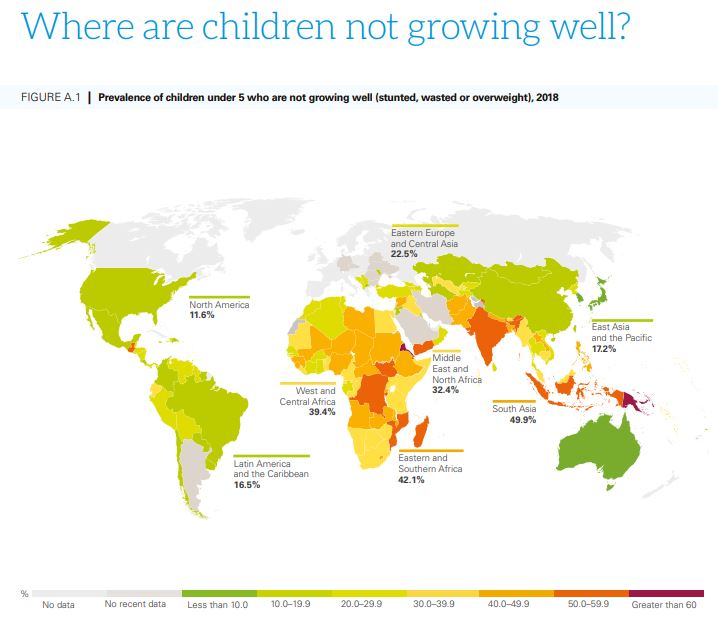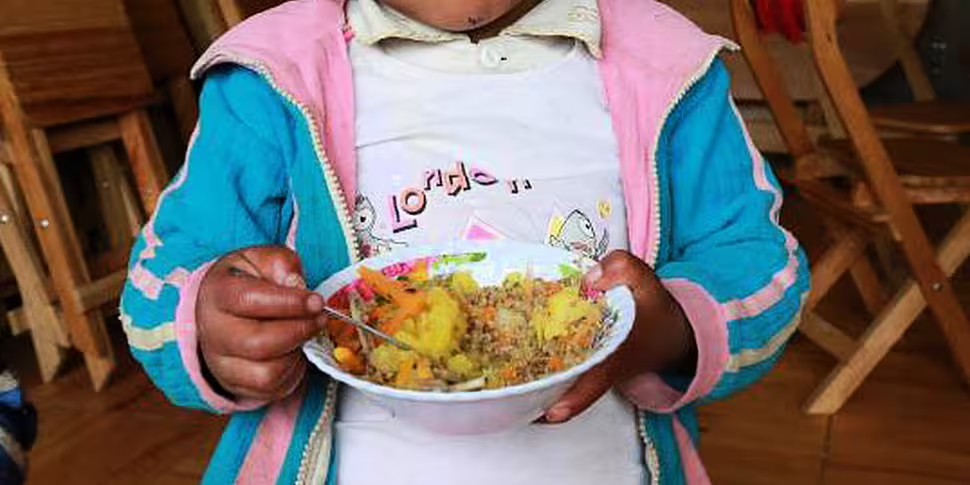A new report has found that at least one in three children under five - or 200 million - is either undernourished or overweight around the world.
UNICEF says an "alarmingly high" number of children are suffering the consequences of poor diets and a food system that is failing them.
'The State of the World's Children 2019: Children, food and nutrition' also found that almost two in three children between six months and two years of age are not fed food that supports their rapidly growing bodies and brains.
"This puts them at risk of poor brain development, weak learning, low immunity, increased infections and, in many cases, death", UNICEF adds.
Growing child malnutrition is being driven by poverty, climate change and poor diet - including low breastfeeding rates.
Henrietta Fore is UNICEF's executive director.
"Despite all the technological, cultural and social advances of the last few decades, we have lost sight of this most basic fact: If children eat poorly, they live poorly.
"Millions of children subsist on an unhealthy diet because they simply do not have a better choice.
"The way we understand and respond to malnutrition needs to change: It is not just about getting children enough to eat; it is above all about getting them the right food to eat. That is our common challenge today."
Worldwide, close to 45% of children between six months and two years of age are not fed any fruits or vegetables.
And nearly 60% do not eat any eggs, dairy, fish or meat.
The report also shows that 42% of school-going adolescents in low and middle-income countries drink carbonated sugary soft drinks at least once a day.
And 46% eat fast food at least once a week.
Those rates go up to 62% and 49%, respectively, for adolescents in high-income countries.
As a result, overweight and obesity levels in childhood and adolescence are increasing worldwide.
Deficiencies
The report describes a triple burden of malnutrition: undernutrition, hidden hunger caused by a lack of essential nutrients, and overweight among children under the age of five.
Around the world, 149 million children are stunted, or too short for their age, while 50 million children are wasted, or too thin for their height.
Some 340 million children suffer from deficiencies in essential vitamins and nutrients such as vitamin A and iron - and 40 million children are overweight or obese.
 Source: UNICEF
Source: UNICEFThe report warns that poor eating and feeding practices start from the earliest days of a child's life.
It says: "Though breastfeeding can save lives, for example, only 42% of children under six months of age are exclusively breastfed and an increasing number of children are fed infant formula.
"Sales of milk-based formula grew by 72% between 2008 and 2013 in upper middle-income countries such as Brazil, China and Turkey, largely due to inappropriate marketing and weak policies and programmes to protect, promote and support breastfeeding.
"As children begin transitioning to soft or solid foods around the six-month mark, too many are introduced to the wrong kind of diet".
Girls vs boys
From 2000 to 2016, the proportion of overweight children between five and 19 years of age doubled from one in 10 to almost one in five.
Ten-times more girls and 12-times more boys in this age group suffer from obesity today than in 1975.
"The greatest burden of malnutrition in all its forms is shouldered by children and adolescents from the poorest and most marginalized communities," the report notes.
"Only one in five children aged six months to two years from the poorest households eats a sufficiently diverse diet for healthy growth.
"Even in high-income countries such as the UK, the prevalence of overweight is more than twice as high in the poorest areas as in the richest areas."
UNICEF is issuing an urgent appeal to governments, the private sector, donors, parents, families and businesses to help children.
This includes empowering families, children and young people to demand nutritious food, driving food suppliers to do the right thing for children and building healthy food environments for children and adolescents by using proven approaches - such as accurate and easy-to-understand labelling, and stronger controls on the marketing of unhealthy foods.









